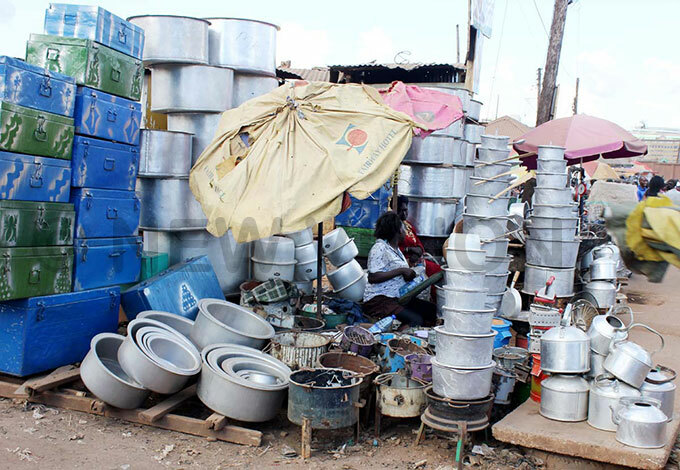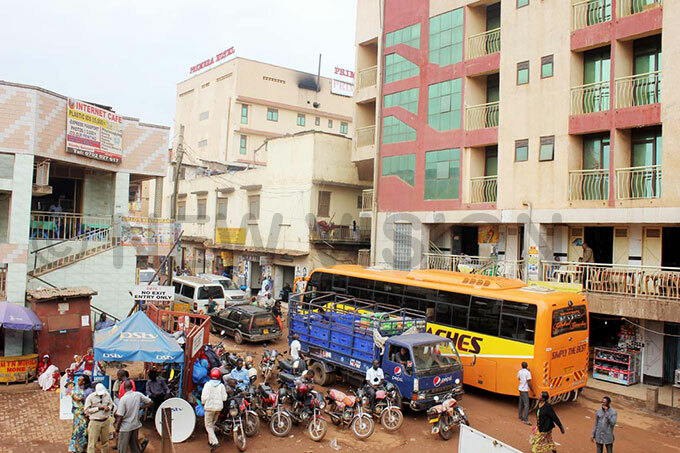How Kisenyi has transformed
Residents there now boast of having; tap water, communal restrooms, tarred connecting roads, street lights, mobile money services, internet cafés- you name it.
Kisenyi, a stone's throw away from the heart of Kampala city and is one of the oldest and fastest-changing slums in the country.
Its trademark of mud and wattle bed-sit units with rusted tin roofs are fast being replaced by; malls, bus terminals, cottage industries, storied commercial and residential structures.
Residents there now boast of having; tap water, communal restrooms, tarred connecting roads, street lights, mobile money services, internet cafés- you name it.
A chat with the local counselor Salim Uhuru was a revelation that more than 50% of the upgraded slum residents are employed in Kampala city where they offer cheap unskilled labor. Others are self-employed petty traders, bike, taxi operators and casual laborers.
 A list of utensil fabricated by artisans in Kisenyi being displayed on the roadside in Kisenyi. (Photo by Titus Kakembo)
A list of utensil fabricated by artisans in Kisenyi being displayed on the roadside in Kisenyi. (Photo by Titus Kakembo)
The Kisenyi skyline is now punctuated with several high-rise structures like; Nakivubo Complex and Noza Market. This is proof that developers are channeling their investments there. Compared to downtown Kampala, Kisenyi offers affordable lodges, hotels, saloons, manicurists and fabrics dealers. The shelves and stalls will provide anything, just ask, pay and camel meat, maize flour, scrap and used underpants will be provided.
The vice spokesperson Uganda Somali Association (USA) Khalif Mohamed recalls how in the 1990s the number of Somalis in Kisenyi was very small.
"The number shot up in the early 1990s after the fall of President Siad Barre," recounts Mohamed. "Many Somalis who fled to Uganda settled in Kisenyi where other Somalis were already living.
The Somali community has since impacted Kisenyi economically and socially by transforming the neighborhood of an area which was previously synonymous with poor livelihoods, a dingy neighborhood, prostitution, and criminal activity.
It does not matter what nationality or religion one belongs to, there is a characteristic the Kisenyi residents share - they dread contraception methods. This is visible by the number of children every homestead has regardless of the size of the house or family income.
 One of the alleys which was a den of thieves is now sandwiched between high-rise structures leaving no space for motorists and pedestrians. (Photo by Titus Kakembo)
One of the alleys which was a den of thieves is now sandwiched between high-rise structures leaving no space for motorists and pedestrians. (Photo by Titus Kakembo)
Mohamed says one of the landmark development pace setters in Kisenyi is Owino Market, a property owned by Bhailal - Tirupati located in Muzaana zone.
"Before that, this was a no go zone even for the law enforcers," confided Mohamed. "But since Owino was built rent for a shop shot from sh100,000-sh300,000. The people renting are better income earners. Those without sufficient income have relocated."
This has made what was a slum an extension of the Central Business District (CBD.) Owino has all the trappings of an affluent urban settlement. It has clean restaurants, spacious shops, sufficient office space, sports betting centers and a parking lot. The guards in place keep the army of idlers, money changers and commission agents behaved.
Elsewhere Kisenyi is punctuated by taxi and bus terminals for commuters destined upcountry. They are abuzz with; hoots, hawkers, touts squealing destinations, commission agents, fruit vendors, pickpockets, and travelers.
The 14 sitter commuters navigate their way to leave or arrive - all day. The hawk-eyed touts hasten to grab passenger's luggage and shove it in the good's rack. Naughty ones can pull a disappearing act in the time it takes an eye to blink. Food vendors with the grace of a ballet dancer saunter about with fruit salads, kicomando, boiled chicken and cakes packed in polythene papers.
A blacksmith Julius Engemu recalls when he settled in Kisenyi way back in 1986 and all that used to be fabricated were tadobas (wicker lamps,) frying pans and charcoal stoves.
"But today we fabricate car spare parts, saucepans and weighing scales. Take a walk and see what is displayed. There are; Okwenyi ainyam saucepans, balcony guards, staircase rails, compound gates, and window frames," Engemu says with pride. "I had to move my wives to another cheap slum called Kosovo. Rent in Kisenyi shot up and made it expensive for a polygamist like me."
"Where Ajon (millet beer brewers) used to dry and fry their raw materials is now occupied by grain milling machines," said Engemu. "Our tree shade pubs are no more. Space is so scarce. KCCA is so strict. You cannot rear goats or chicken here. I want to retire back to Omagoro, in north Teso, in two years."
A tour of Engena's workplace was a revelation of pale-skinned and toothpick limbed Karimojong street kids picking; maize, beans, potatoes, and carrots that drop in the process of off-loading. The grains that find their way to the mills, come out, white like snow and are packed in 5, 10 and 50kg bags. Poultry feeds and rat